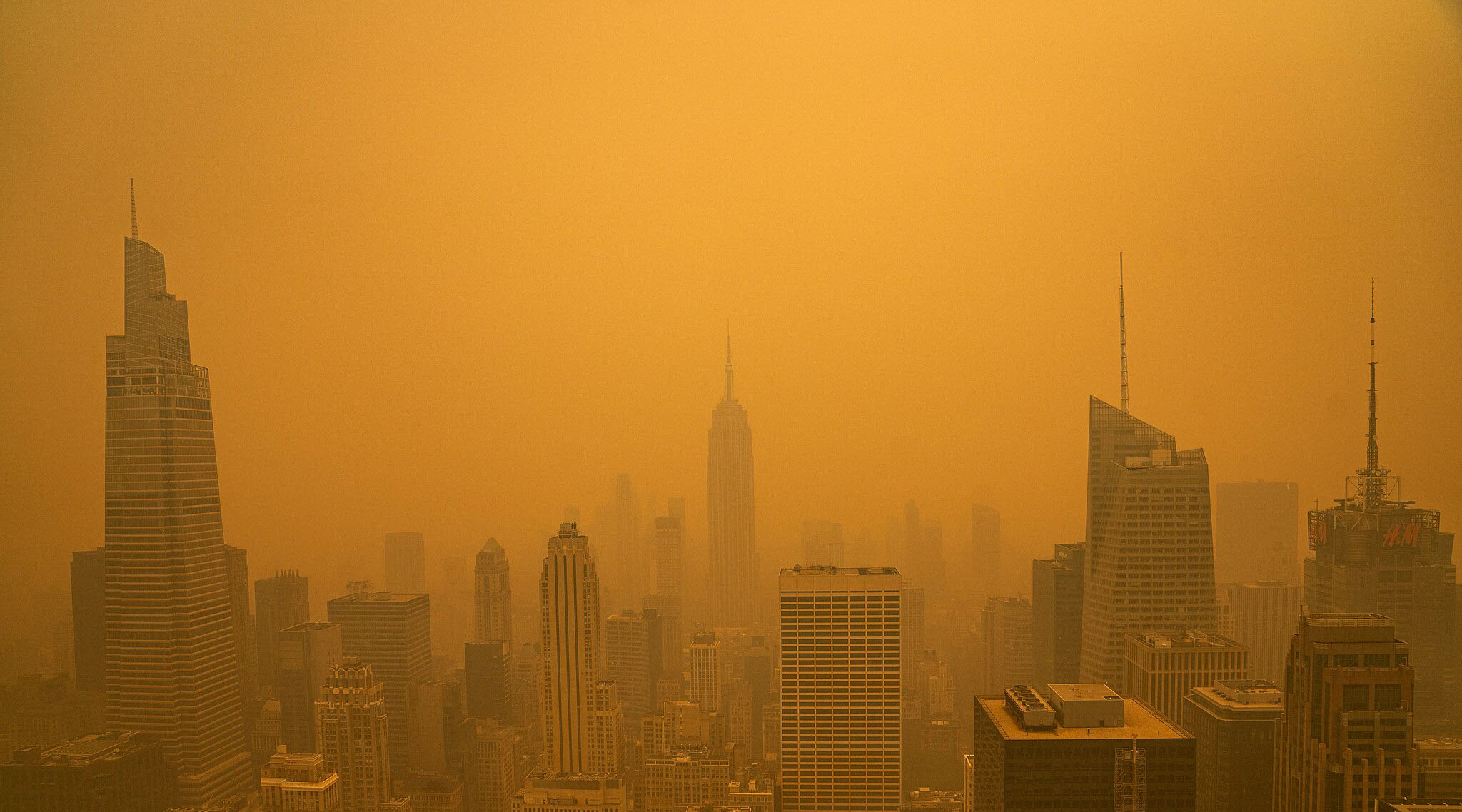A Smoky Day Story by Tom Roderick
Morningside's founding executive director shares a story about smoke, the climate crisis, and his brand new book.
Morningside's founding executive director shares a story about smoke, the climate crisis, and his brand new book.

On Wednesday June 7, 2023, at 11:45 am, I opened the door of my apartment building and stepped into dystopia.
I had heard on the radio that smoke was on its way from the Canadian wildfires and that an air-quality advisory had been issued for New York City. But I had not expected the darkness at noon, the orange sky, the haze, and the acrid smoky breeze that hit me in the face. I went back upstairs to get a jacket and a mask, then made my way around the corner to catch a bus for lunch with my daughter.
Along the way, I detoured into the street to get around a sidewalk jammed with parents. It was the last day of classes at a local independent school, and dismissal was at noon. Parents and caregivers were enthusiastically greeting the children as they exited from the school. SUVs and a school bus had pulled up as well, blocking the bus stop.
An ambulance speeding up Broadway to a nearby hospital added its wailing siren to the cacophonous scene. I was struck by the juxtaposition of cheering parents and happy children under the smoky, dark orange sky. I couldn’t help but imagine a similar scene in response to a full-scale disaster: crowds of desperate parents jostling with each other to rescue frightened children, all to the tune of high-pitched sirens.
Finally, my bus pulled up. I followed a man and his young daughter onto the bus, and we took our seats. We had just started moving when we were assaulted by another screaming siren behind us. A fire truck was urgently demanding to get through. Our driver pulled over as best he could and the fire truck zoomed past. Whew! Just a few minutes after 12 and I’d already had my fill of drama for the day.
In the calm that followed, I overheard part of the conversation between the father and his daughter, seated just across the aisle from me. She appeared to be eight or nine years old and was sitting by the window. “What will happen to the animals in the wildfires?” she asked. “Will they be able to run from the fire? What if they can’t run?” I listened for his response, but couldn’t make it out.
The father and daughter got off a few blocks later. As the bus crawled down Fifth Avenue in heavy traffic, I felt for the young girl and for children like her throughout the city, on a day when all outdoor activities at schools had been canceled. I wondered what children and young people in schools across the city were feeling and thinking as they lived through a day sheltering from the smoke under an ominous orange sky. In most schools, they would be expected to carry on as if nothing was happening, left alone with their thoughts and emotions.
If I had been the mayor or schools’ chancellor, I would have suggested that educators throughout the city pause from their regular lessons and give young people a chance to share their knowledge, thoughts, feelings, and questions about the strange day they were experiencing. The aim would not be to spread doom and gloom, but instead to provide a teachable moment to build understanding and to give our children and young people the message that we’re in this with them and we have their backs.
In my many years as executive director of Morningside Center, we found this process, called a “listening circle,” to be invaluable – not just in classrooms, but in our own office. In the weeks after 9/11, our staff held daily listening circles that not only brought individual healing, but knit our group together at a time of crisis.
If I’d been a classroom teacher on that smoky day in June, here’s how I might have adapted the listening circle for my students on that day: Smoky Day Listening Circle.
With the climate crisis upon us, we’re likely to see many more smoky days – and other upsetting disruptions – in the years ahead. Fortunately, we as educators are in a position to help young people, and each other, navigate our way through the hard times, together.
The listening circle is just one of many invaluable social and emotional learning tools we have at our disposal to skillfully address the climate crisis.
In fact, I have just written a book describing many of these strategies, drawing not just on Morningside’s experience, but on that of innovative and resourceful educators I’ve met from around the country.
Teach for Climate Justice: A Vision for Transforming Education is just out now from Harvard Education Press. Have a look, and share the news! Also be on the lookout for more resources and opportunities from me and Morningside to support us as we teach for the times ahead.